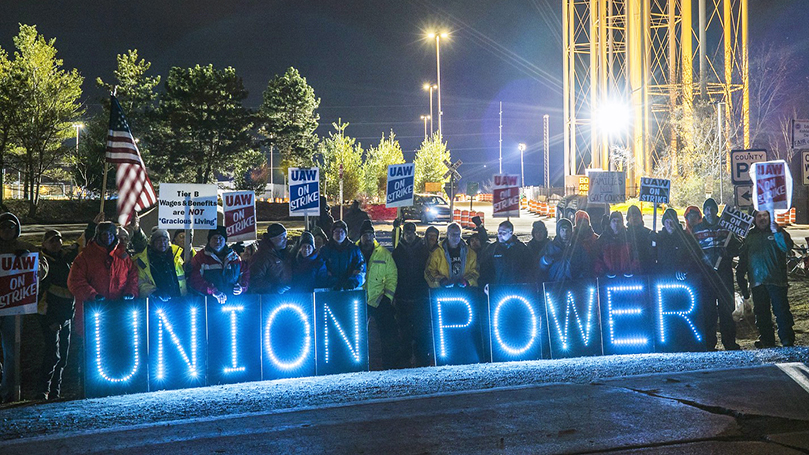
Will a general strike become necessary in order to defend democracy?
This question is increasingly being discussed as Trump refuses to pledge to peacefully transfer power if defeated. In the meantime, the trade union movement is going all out to defeat Donald Trump on November 3. The National AFL-CIO has made the election a top priority, and state federation and local labor councils are phone banking, texting, and in many places going door-to-door to bring out the vote on Tuesday. Labor’s actions are part of a massive wave of efforts by people of color and community, religious, and social justice groups to remove Trump from office. Spontaneous grassroots efforts are also off the charts, and early voting is setting new records as a mass electoral uprising takes shape.
The country is passing through an extraordinary moment and the call to consider striking is something new. In a few places, local and regional labor councils have passed resolutions calling for strike action. The conversation started in the Rochester Central Labor Council, which voted to strike if necessary and continued with resolutions passed in the Seattle and western Massachusetts labor councils. In Detroit, postal workers have also lent their voices to the call. Significantly, some labor leaders are circulating a pledge for “Labor Action to Defend Democracy,” which calls for peaceful trade union action in anticipation of an attempt by Trump and the Republican Party to make an end run around the election.
The pledge says in part:
If Donald Trump and his GOP enablers attempt to obstruct, subvert, sabotage, overturn or reject a fair and complete count of presidential ballots (essentially a coup against democracy), the labor movement (unions, worker centers and allied labor organizations) must respond with nonviolent action to defend democracy, the Constitution and an orderly transfer of power that is one of the historic hallmarks of American democracy.
Coming on the heels of the 2018-19 strike wave, workers are increasingly signaling that it’s no longer business as usual. There’s a growing confidence in their power and recognition that with unity, they can win. Sara Nelson, head of the Association of Flight Attendants, when asked what might it take to effectively resist an attempted coup by Trump, put it this way: “We will have to do the one thing that takes all power and control from the government or anyone with corporate interests in keeping this person in office, and that is withholding our labor.”
Going forward as the discussion deepens there will be a need to push back in our own ranks. There will be a need to engage with workers who supported Trump and explain why the need to protect the democratic process is so important. This will include being prepared for confrontations and not being provoked.
Clearly coalition building with community groups and activist organization is the only path to victory. In this regard the labor movement has built and will continue to build strong relations. One thing is beyond doubt – even with Covid millions will have to be in motion with rallies and other forms of public pressure.
Whether unions if pushed will choose to strike remains unclear. Unemployment remains high, and the crisis of everyday living is severe – factors that may both increase and lessen the willingness to set up picket lines.
What is clear is that labor is rising to the political challenge presented by the Trump presidency. To strike or not to strike may not be the question right now—but the important thing is that they’re talking about it. And the country is listening.
Image: Joe Brusky (CC BY-NC 2.0).
Editor’s note: If readers hear of developments including decisions by local labor unions, please share the information! We’re in a big country and a lot is happening! Write to cpusa@cpusa.org.
This article has been updated.


 Join Now
Join Now